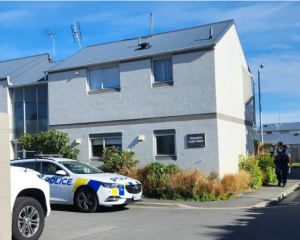
Transport Minister Simeon Brown pushed through weaker carbon emissions standards in time to meet the car industry's preferred deadline, documents show.
His own officials wanted to give Cabinet another month to decide, to allow more consideration of options.
Other emails released by the Ministry of Transport showed environment officials tried at the last minute to warn Cabinet the move risked blowing the country's climate targets.
However, they were told they were too late to get the advice in a Cabinet paper.
Importers bring in hundreds of thousands of new and used vehicles every year.
According to the Productivity Commission, New Zealand and Australia were the last developed countries to introduce tailpipe emissions standards on imports, aside from Russia.
The rules were designed to stop New Zealand becoming a dumping ground for high-emitting gas guzzlers that other countries no longer wanted, by requiring importers to bring in a mix of utes and heavy high-emitting cars along with smaller models, electrics and hybrids.
A benefit/cost analysis in 2019 estimated the standards would save New Zealanders $1.2 to $4.7 billion over 20 years, including about $7000 a year per vehicle in fuel savings.
The rules were designed to get stricter over time, eventually catching up with leading jurisdictions in Europe and elsewhere.
A concerted lobbying effort by major car industry groups failed to stop the standards being brought in, but the industry succeeded in getting them weakened this year after National promised to "recalibrate" them.
New Zealand's standards will now lag Europe by about five years and the United States by about two years. They will align with Australia, where incoming rules were also weakened after car industry pushback.
Change made in time for car industry's deadline
Documents released by the ministry showed officials advised Brown to give Cabinet until 31 July to make a decision on the advice to tweak the rules. They said this would allow more time to consider options aside from what they called a "blunt" reduction.

The change to the standards was announced to the public in early July, after the necessary legal changes had been put through Parliament under urgency.
Brown told RNZ he made the decision when he did to give both consumers and the industry certainty and ease cost of living pressures. Importers had told him they would pass on penalties for not meeting the standards to customers, he said.
Advice to consult EV groups ignored
The Ministry of Transport carried out wide consultation before bringing in the original standards, including getting independent analysis from overseas.
Sourcing electric utes happened slower than was expected when the rules were written, the documents showed.
But EV imports were ahead of expectations because of the previous government's subsidies.
The standards came with a built-in review, scheduled for this year.
Documents showed Brown directed his officials to engage with only three groups about the timeline and scope for the review: the Motor Industry Association, the Imported Motor Vehicle Industry Association and the Motor Trade Association.
Those groups included the most vocal opponents of the standards being introduced.
Brown ignored a suggestion from his officials that "you may also want to direct us to approach organisations that would have a high level of interest in the review, such as Drive Electric".
Asked why groups with different perspectives were left out, Brown said: "Targeted consultation with vehicle industry stakeholders was considered appropriate due to the technical nature of the proposals and because vehicle importers are most affected by any policy changes. The stakeholders consulted count manufacturers of electric vehicles among their members."
After consulting those groups, transport officials concluded the targets were unachievable.
The Motor Industry Association told them that unless the standards were weakened, three quarters of imports would attract penalties in 2027 and importers would pass on costs of $5000 per vehicle to new buyers, a total of $800 million in penalties.
The Imported Motor Vehicle Industry Association said in 2025-2027, importers could source at best 4000-6000 battery electric vehicles from Japan, and it would be virtually impossible to source used hybrid vehicles to compensate for lower EV imports.
Part of the reason was National scrapping EV subsidies.
The groups said that with EV sales crashing after the end of the Clean Car Discount, they were running out of surplus credits they had built up from importing electric cars.
The flood of EVs had been more than counterbalancing the utes and heavy fossil fuel cars they wanted to import, but that was about the change, they said.

"Advice provided to me by the Ministry of Transport found that under current targets set by the former Government ... penalties are forecast to amount to approximately $800.6 million of cost to consumers purchasing a new car in 2027 which is around $5,549 per vehicle," it said.
In fact, those figures were from the Motor Industry Association.
There was no independent analysis of the cost figures because it was "not possible", Brown told RNZ.
"There is no independent organisation - including the Ministry of Transport - that is privy to the supply agreements vehicle distributors have with their overseas suppliers."
Ministry for the Environment's late plea
Transport officials estimated weakening the standards could add up to two million tonnes of carbon dioxide emissions to the atmosphere between now and 2050.
They considered that level of emissions over 20+ years immaterial in the scheme of the country's climate targets, especially considering they were still forecasting the remaining standards would save more than nine million tonnes of carbon dioxide.
They told Brown it was unlikely the original standards would have achieved their full estimated climate benefits anyway, because the car industry would not have been able to meet them.
But their counterparts in the Ministry for the Environment thought the climate modelling "missed important nuance".
After seeing the modelling, the ministry tried unsuccessfully to change its advice to Cabinet, in order to warn that the changes could make it "materially" harder to meet the country's climate targets.
"With the updated modelling, our agency comment is no longer accurate and needs to be updated," an environmental adviser told a transport counterpart via an email.
The updated advice to Cabinet would have said, in full:
"[The Ministry for the Environment's] view is that this paper would have benefited from considering additional options that could better balance the impact on consumers and ambition for emissions reduction. This could include options to support industry to meet existing targets, options to adjust the level of charges for exceeding targets, and options for more moderate reductions in targets.
"Substantially reducing ambition from short-term targets should not be the only option considered in response to missing those targets.
"[The ministry] also considers the analysis of the impacts of the proposed changes on the mix of vehicle imports and related emissions to miss an important nuance…. [the ministry] views that the proposed changes will make achieving emissions budgets two and three materially more difficult, in a context where meeting those budgets is already challenging."
However the officials were told the Cabinet paper had already been lodged and their only option was to contact their minister, Simon Watts, so Watts could raise their concerns with Cabinet if he wished to.
Before writing this story, RNZ requested from the government copies of any lobbying letters it had received from the car industry about the tailpipe standards, under the Official Information Act.
One letter from a pro-EV group was released.
However another letter was deemed so sensitive that even the title and who it was from were withheld, on the basis that making it public would prejudice future supply of similar information to the government.
RNZ has appealed to the ombudsman, seeking release of the letter.













